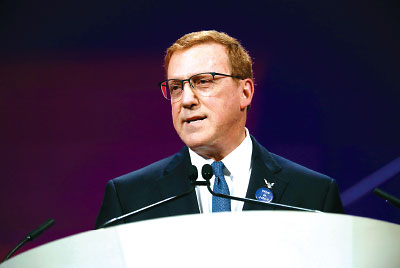Levin Speaks to Future of a ‘Noble’ Profession
Abstract
APA is adapting to new technologies and collaborating with other specialties.
APA’s 2019 Annual Meeting was a celebration of psychiatry’s past but also a blueprint for the future, said APA CEO and Medical Director Saul Levin, M.D., M.P.A., in his Opening Session address last month in San Francisco.

“I envy the psychiatrists of tomorrow and the treatments they will have in their medical bag,” says APA CEO and Medical Director Saul Levin, M.D., M.P.A.
Levin drew attention to the special 175th Anniversary History Track, a series of sessions highlighting various aspects of APA’s history and the history of psychiatry. “Each one of us here today is a product of that history, and the work we do here during the meeting will be the foundation upon which the future of mental health care and our own legacy is built.”
He said that in the past year APA has responded to the challenges facing American medicine by adapting to new technologies and to the demand for new models of care by collaborating with physicians in other specialties.
“We psychiatrists are educated to the top of our profession and speak for the health and complexity of those with mental illness and substance use disorders,” Levin said. “No one can do this as comprehensively [as] psychiatrists. For all the progress we’ve made, there are still some areas where we must improve as we work toward our next milestones—the 200th and 225th anniversaries.”
Levin recalled a recent visit to India where he attended the Indian Psychiatric Society’s meeting. He was particularly touched by a presentation by Bharat Vatwani, M.B.B.S., titled “The Wandering Mentally Ill Destitute.” Vatwani was one of two Indians awarded the 2018 Ramon Magsaysay Award for his work with mentally ill street people.
Vatwani made an impassioned plea to leaders, psychiatrists, other physicians, and the communities within India to “see and acknowledge in his country those with mental illness who wander the streets, bereft of treatment, family, safe haven of housing, or a sense of community [and] who are often in poor health,” Levin said.
He said Vatwani showed images of those who had received treatment and returned to their families and the villages they had had to leave. These images showing the community celebrating and embracing the newly recovered family member brought tears to the eyes of an entire audience of psychiatrists, Levin added.
“We face the same issues in the United States, including here in San Francisco, which has one of the largest homeless populations in the country, with numbers approaching 8,000.”
But the future is promising, he said. And in comments specifically addressed to APA’s aspiring and newest psychiatrists—medical students, residents, and early career psychiatrists—he said that he envied the treatments, procedures, and even cures that they will have in their physician’s medical bag in the future.
But APA will still be fighting to make America an ever-more caring nation and a healthier one. “At this 175th anniversary meeting, I think we will all be reminded why we entered this noble profession.” Levin said. ■



